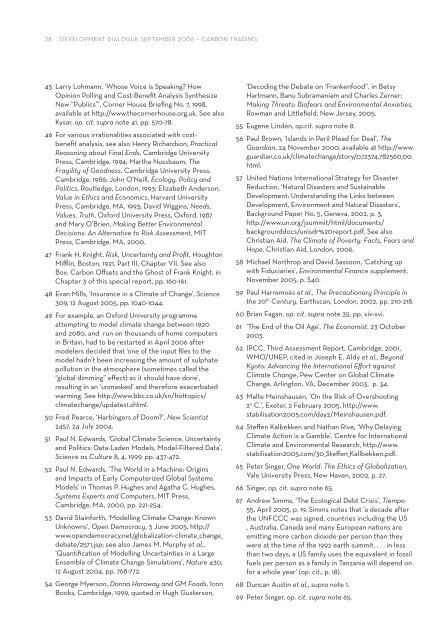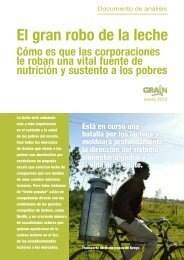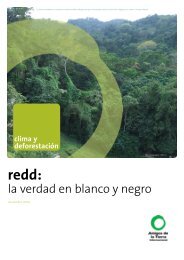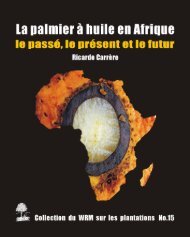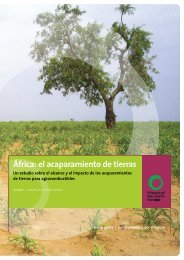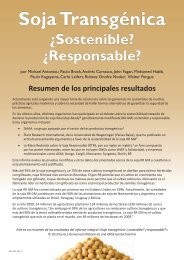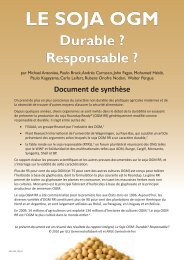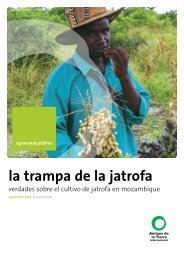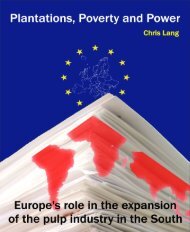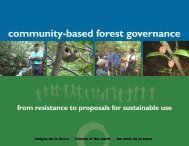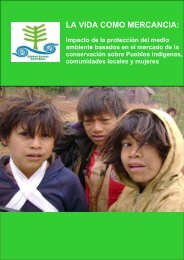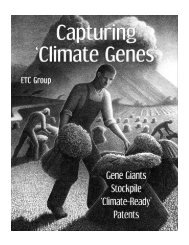28 development dialogue september 2006 – carbon trading45 Larry Lohmann, ‘Whose Voice is Speaking? HowOpinion Polling and Cost-Benefit Analysis SynthesizeNew “Publics”’, Corner House Briefing No. 7, 1998,available at http://www.thecornerhouse.org.uk. See alsoKysar, op. cit. supra note 41, pp. 570-78.46 For various irrationalities associated with costbenefitanalysis, see also Henry Richardson, PracticalReasoning about Final Ends, Cambridge UniversityPress, Cambridge, 1994; Martha Nussbaum, TheFragility of Goodness, Cambridge University Press,Cambridge, 1986; John O’Neill, Ecology, Policy andPolitics, Routledge, London, 1993; Elizabeth Anderson,Value in Ethics and Economics, Harvard UniversityPress, Cambridge, MA, 1993; David Wiggins, Needs,Values, Truth, Oxford University Press, Oxford, 1987and Mary O’Brien, Making Better EnvironmentalDecisions: An Alternative to Risk Assessment, MITPress, Cambridge, MA, 2000.47 Frank H. Knight, Risk, Uncertainty and Profit, HoughtonMifflin, Boston, 1921, Part III, Chapter VII. See alsoBox: Carbon Offsets and the Ghost of Frank Knight, inChapter 3 of this special report, pp. 160-161.48 Evan Mills, ‘Insurance in a Climate of Change’, Science309, 12 August 2005, pp. 1040-1044.49 For example, an Oxford University programmeattempting to model climate change between 1920and 2080, and run on thousands of home computersin Britain, had to be restarted in April 2006 aftermodelers decided that ‘one of the input files to themodel hadn’t been increasing the amount of sulphatepollution in the atmosphere (sometimes called the“global dimming” effect) as it should have done’,resulting in an ‘unmasked’ and therefore exacerbatedwarming. See http://www.bbc.co.uk/sn/hottopics/climatechange/updates1.shtml.50 Fred Pearce, ‘Harbingers of Doom?’, New Scientist2457, 24 July 2004.51 Paul N. Edwards, ‘Global Climate Science, Uncertaintyand Politics: Data-Laden Models, Model-Filtered Data’,Science as Culture 8, 4, 1999, pp. 437-472.52 Paul N. Edwards, ‘The World in a Machine: Originsand Impacts of Early Computerized Global SystemsModels’ in Thomas P. Hughes and Agatha C. Hughes,Systems Experts and Computers, MIT Press,Cambridge, MA, 2000, pp. 221-254.53 David Stainforth, ‘Modelling Climate Change: KnownUnknowns’, Open Democracy, 3 June 2005, http://www.opendemocracy.net/globalization-climate_change_debate/2571.jsp; see also James M. Murphy et al.,‘Quantification of Modelling Uncertainties in a LargeEnsemble of Climate Change Simulations’, Nature 430,12 August 2004, pp. 768-772.54 George Myerson, Donna Haraway and GM Foods, IconBooks, Cambridge, 1999, quoted in Hugh Gusterson,‘Decoding the Debate on ‘Frankenfood’’, in BetsyHartmann, Banu Subramaniam and Charles Zerner:Making Threats: Biofears and Environmental Anxieties,Rowman and Littlefield, New Jersey, 2005.55 Eugene Linden, op.cit. supra note 8.56 Paul Brown, ‘Islands in Peril Plead for Deal’, TheGuardian, 24 November 2000, available at http://www.guardian.co.uk/climatechange/story/0,12374,782560,00.html.57 United Nations International Strategy for DisasterReduction, ‘Natural Disasters and SustainableDevelopment: Understanding the Links betweenDevelopment, Environment and Natural Disasters’,Background Paper No. 5, Geneva, 2002, p. 3,http://www.un.org/jsummit/html/documents/backgrounddocs/unisdr%20report.pdf. See alsoChristian Aid, The Climate of Poverty: Facts, Fears andHope, Christian Aid, London, 2006.58 Michael Northrop and David Sassoon, ‘Catching upwith Fiduciaries’, Environmental Finance supplement,November 2005, p. S40.59 Paul Harremoës et al., The Precautionary Principle inthe 20 th Century, Earthscan, London, 2002, pp. 210-218.60 Brian Fagan, op. cit. supra note 35, pp. xiv-xvi.61 ‘The End of the Oil Age’, The Economist, 23 October2003.62 IPCC, Third Assessment Report, Cambridge, 2001,WMO/UNEP, cited in Joseph E. Aldy et al., BeyondKyoto: Advancing the International Effort againstClimate Change, Pew Center on Global ClimateChange, Arlington, VA, December 2003, p. 34.63 Malte Meinshausen, ‘On the Risk of Overshooting2 o C.’, Exeter, 2 February 2005, http://www.stabilisation2005.com/day2/Meinshausen.pdf.64 Steffen Kalbekken and Nathan Rive, ‘Why DelayingClimate Action is a Gamble’, Centre for InternationalClimate and Environmental Research, http://www.stabilisation2005.com/30_Steffen_Kallbekken.pdf.65 Peter Singer, One World: The Ethics of Globalization,Yale University Press, New Haven, 2002, p. 27.66 Singer, op. cit. supra note 65.67 Andrew Simms, ‘The Ecological Debt Crisis’, Tiempo55, April 2005, p. 19. Simms notes that ‘a decade afterthe UNFCCC was signed, countries including the US, Australia, Canada and many European nations areemitting more carbon dioxide per person than theywere at the time of the 1992 earth summit. . . . in lessthan two days, a US family uses the equivalent in fossilfuels per person as a family in Tanzania will depend onfor a whole year’ (op. cit., p. 18).68 Duncan Austin et al., supra note 1.69 Peter Singer, op. cit. supra note 65.
introduction – a new fossil fuel crisis 2970 See Chapters 3 and 5, as well as such recent works as,for example, George Monbiot, Heat: How to Stop thePlanet Burning, Allen Lane, London, 2006.71 Stephen Kretzmann and Irfan Nooruddin, Drilling intoDebt: An Investigation into the Relationship betweenDebt and Oil, Oil Change International, Washington,2005.72 For recent documentation, see, for example, thewebsite of Oilwatch, http://www.oilwatch.org andPlatform, Pumping Poverty: Britain’s Departmentfor International Development and theOil Industry,Platform, London, 2005, http://www.carbonweb.org/documents/pumping_poverty_web.pdf; and BrettonWoods Project, ‘Chad-Cameroon Pipeline: Corruptionand Double Standards’, London, 2004.73 See http://cnews.canoe.ca/CNEWS/Science/2005/11/17/1311486-cp.html’target=3D’_blank’>Dennis Bueckert: CNEWS, 17 November 2005.74 MacDonald Stainsby, ‘Canada, the US, and the TarSands’, Z Magazine, 31 December 2005, http://www.zmag.org/.75 United Nations Framework Convention on ClimateChange, Conference of the Parties 11, OpeningCeremonies: Speaking Notes for the HonourableStéphane Dion, P.C., M.P., Minister of the Environment,Montreal, 28 November 2005.76 Paul Brown, ‘Energy Efficiency Targets Scrapped’, TheGuardian, 18 July 2005.77 House of Lords, Science and Technology Committee,‘Renewable Energy: Practicalities’, Fourth Report ofSession 2003-04, Volume I: Report, Stationery Office,London, 2004, p. 7.78 Tony Blair, video address to the InternationalConference on Renewable Energy, Bonn, 1-4 June,2004.79 Prime Minister’s speech on climate change, 14September 2004.80 Tony Blair, ‘Get Real on Climate Change’, Observer(London) 30 October 2005.81 Tyndall Centre for Climate Change Research,Decarbonizing the UK: Energy for a Climate ConsciousFuture, Exeter, 2005.82 International Energy Agency, World Energy Outlook2005, Paris, 2005, http://www.iea.org/Textbase/press/pressdetail.asp?PRESS_REL_ID=163.83 Darcy Frey, ‘How Green Is BP?’, New York TimesMagazine, 8 December 2002.84 John Browne, ‘Beyond Kyoto’, Foreign Affairs, July/August 2004.85 ‘Shell Boss Fears for the Planet’, BBC News, 17 June2004.86 World Business Council for Sustainable Development,Sharpening the Focus for Action – A BusinessPerspective, WBCSD, 2005, http://www.wbcsd.org/.87 Jim Vallette et al., Wrong Turn from Rio: The WorldBank’s Road to Climate Catastrophe, Institute forPolicy Studies, Washington, 2004, p. 5.88 Ibid.89 Jon Sohn et al., ‘Mainstreaming Climate Change at theMultilateral Development Banks’, World ResourcesInstitute, Washington, 2005.90 Ibid.91 Jim Vallette and Steve Kretzmann, The Energy Tug ofWar: The Winners and Losers of World Bank Fossil FuelFinance, Institute for Policy Studies, Washington, 2004,pp. 21-26.92 See http://web.worldbank.org.
- Page 1 and 2: a critical conversationon climate c
- Page 3 and 4: ContentsEditorial note 2Chapter 1 I
- Page 5: editorial note 3in Dorset, UK - poi
- Page 8 and 9: 6 development dialogue september 20
- Page 10 and 11: 8 development dialogue september 20
- Page 12 and 13: 10 development dialogue september 2
- Page 14 and 15: 12 development dialogue september 2
- Page 16 and 17: 14 development dialogue september 2
- Page 18 and 19: 16 development dialogue september 2
- Page 20 and 21: 18 development dialogue september 2
- Page 22 and 23: 20 development dialogue september 2
- Page 24 and 25: 22 development dialogue september 2
- Page 26 and 27: 24 development dialogue september 2
- Page 28 and 29: 26 development dialogue september 2
- Page 34 and 35: 32 development dialogue september 2
- Page 36 and 37: 34 development dialogue september 2
- Page 38 and 39: 36 development dialogue september 2
- Page 40 and 41: 38 development dialogue september 2
- Page 42 and 43: 40 development dialogue september 2
- Page 44 and 45: 42 development dialogue september 2
- Page 46 and 47: 44 development dialogue september 2
- Page 48 and 49: 46 development dialogue september 2
- Page 50 and 51: 48 development dialogue september 2
- Page 52 and 53: 50 development dialogue september 2
- Page 54 and 55: 52 development dialogue september 2
- Page 56 and 57: 54 development dialogue september 2
- Page 58 and 59: 56 development dialogue september 2
- Page 60 and 61: 58 development dialogue september 2
- Page 62 and 63: 60 development dialogue september 2
- Page 64 and 65: 62 development dialogue september 2
- Page 66 and 67: 64 development dialogue september 2
- Page 68 and 69: 66 development dialogue september 2
- Page 70 and 71: 68 development dialogue september 2
- Page 73 and 74: Chapter 3Lessons unlearnedIn which
- Page 75 and 76: lessons unlearned 73Property rights
- Page 77 and 78: lessons unlearned 75of the emission
- Page 79 and 80: lessons unlearned 77It’s not so s
- Page 81 and 82:
lessons unlearned 79his place. The
- Page 83 and 84:
lessons unlearned 81‘The creation
- Page 85 and 86:
lessons unlearned 83‘Temporary’
- Page 87 and 88:
lessons unlearned 85Utility Commiss
- Page 89 and 90:
lessons unlearned 87trading, includ
- Page 91 and 92:
lessons unlearned 89Table 2. Quasi-
- Page 93 and 94:
lessons unlearned 91While most asse
- Page 95 and 96:
lessons unlearned 93and 290-545 for
- Page 97 and 98:
lessons unlearned 95What do you mea
- Page 99 and 100:
lessons unlearned 97reaching, unifo
- Page 101 and 102:
lessons unlearned 99monitoring of i
- Page 103 and 104:
lessons unlearned 101Yes. But that
- Page 105 and 106:
lessons unlearned 103oranges into a
- Page 107 and 108:
lessons unlearned 105yet, maybe no
- Page 109 and 110:
lessons unlearned 107It’s hard to
- Page 111 and 112:
lessons unlearned 109fact involved
- Page 113 and 114:
lessons unlearned 111‘Locking in
- Page 115 and 116:
lessons unlearned 113Figure 3. A Vi
- Page 117 and 118:
lessons unlearned 115Climate and th
- Page 119 and 120:
lessons unlearned 117power, for ins
- Page 121 and 122:
lessons unlearned 119Does Emissions
- Page 123 and 124:
lessons unlearned 121No empirical e
- Page 125 and 126:
lessons unlearned 123only make it w
- Page 127 and 128:
lessons unlearned 125And probably y
- Page 129 and 130:
lessons unlearned 127flow of fossil
- Page 131 and 132:
lessons unlearned 129could even end
- Page 133 and 134:
lessons unlearned 131But how much h
- Page 135 and 136:
lessons unlearned 133‘Little’ P
- Page 137 and 138:
lessons unlearned 135Or the World R
- Page 139 and 140:
lessons unlearned 137The special pr
- Page 141 and 142:
lessons unlearned 139Still other du
- Page 143 and 144:
lessons unlearned 141But doesn’t
- Page 145 and 146:
lessons unlearned 143So CDM schemes
- Page 147 and 148:
lessons unlearned 145carbon money.
- Page 149 and 150:
lessons unlearned 147‘The CDM wil
- Page 151 and 152:
lessons unlearned 149based credit m
- Page 153 and 154:
lessons unlearned 151scrapped, the
- Page 155 and 156:
lessons unlearned 153Sinks, biophys
- Page 157 and 158:
lessons unlearned 155kilometres ben
- Page 159 and 160:
lessons unlearned 157Figure 7. Poss
- Page 161 and 162:
lessons unlearned 159• In early 2
- Page 163 and 164:
lessons unlearned 161But such credi
- Page 165 and 166:
lessons unlearned 163subtropical ca
- Page 167 and 168:
lessons unlearned 165Figure 8. Shar
- Page 169 and 170:
lessons unlearned 167Ownership agai
- Page 171 and 172:
lessons unlearned 169identified in
- Page 173 and 174:
lessons unlearned 171cen turies, ye
- Page 175 and 176:
lessons unlearned 173Who Owns Fores
- Page 177 and 178:
lessons unlearned 175How?The pollut
- Page 179 and 180:
lessons unlearned 177Innovation, th
- Page 181 and 182:
lessons unlearned 179I don’t agre
- Page 183 and 184:
lessons unlearned 181carbon credits
- Page 185 and 186:
lessons unlearned 183Segments of th
- Page 187 and 188:
lessons unlearned 185pet schemes, e
- Page 189 and 190:
lessons unlearned 187Where’s the
- Page 191 and 192:
lessons unlearned 189of cheating po
- Page 193 and 194:
lessons unlearned 191face to the pu
- Page 195 and 196:
lessons unlearned 193are those area
- Page 197 and 198:
lessons unlearned 195atmospheric ca
- Page 199 and 200:
lessons unlearned 197it would have
- Page 201 and 202:
lessons unlearned 199inadequate val
- Page 203 and 204:
lessons unlearned 20123 Timothy Mit
- Page 205 and 206:
lessons unlearned 20388 Frantisek B
- Page 207 and 208:
lessons unlearned 205147 Adam B. Ja
- Page 209 and 210:
lessons unlearned 207183 Lipow, op.
- Page 211 and 212:
lessons unlearned 209237 Bastianoni
- Page 213 and 214:
lessons unlearned 211275 CEE Bankwa
- Page 215 and 216:
lessons unlearned 213Thermostat’,
- Page 217 and 218:
lessons unlearned 215398 Ibid. See
- Page 221 and 222:
Chapter 4Offsets - The fossil econo
- Page 223 and 224:
offsets - the fossil economy’s ne
- Page 225 and 226:
offsets - the fossil economy’s ne
- Page 227 and 228:
offsets - the fossil economy’s ne
- Page 229 and 230:
offsets - the fossil economy’s ne
- Page 231 and 232:
offsets - the fossil economy’s ne
- Page 233 and 234:
offsets - the fossil economy’s ne
- Page 235 and 236:
offsets - the fossil economy’s ne
- Page 237 and 238:
offsets - the fossil economy’s ne
- Page 239 and 240:
offsets - the fossil economy’s ne
- Page 241 and 242:
offsets - the fossil economy’s ne
- Page 243 and 244:
offsets - the fossil economy’s ne
- Page 245 and 246:
offsets - the fossil economy’s ne
- Page 247 and 248:
offsets - the fossil economy’s ne
- Page 249 and 250:
offsets - the fossil economy’s ne
- Page 251 and 252:
offsets - the fossil economy’s ne
- Page 253 and 254:
offsets - the fossil economy’s ne
- Page 255 and 256:
offsets - the fossil economy’s ne
- Page 257 and 258:
offsets - the fossil economy’s ne
- Page 259 and 260:
offsets - the fossil economy’s ne
- Page 261 and 262:
offsets - the fossil economy’s ne
- Page 263 and 264:
offsets - the fossil economy’s ne
- Page 265 and 266:
offsets - the fossil economy’s ne
- Page 267 and 268:
offsets - the fossil economy’s ne
- Page 269 and 270:
offsets - the fossil economy’s ne
- Page 271 and 272:
offsets - the fossil economy’s ne
- Page 273 and 274:
offsets - the fossil economy’s ne
- Page 275 and 276:
offsets - the fossil economy’s ne
- Page 277 and 278:
offsets - the fossil economy’s ne
- Page 279 and 280:
offsets - the fossil economy’s ne
- Page 281 and 282:
offsets - the fossil economy’s ne
- Page 283 and 284:
offsets - the fossil economy’s ne
- Page 285 and 286:
offsets - the fossil economy’s ne
- Page 287 and 288:
offsets - the fossil economy’s ne
- Page 289 and 290:
offsets - the fossil economy’s ne
- Page 291 and 292:
offsets - the fossil economy’s ne
- Page 293 and 294:
offsets - the fossil economy’s ne
- Page 295 and 296:
offsets - the fossil economy’s ne
- Page 297 and 298:
offsets - the fossil economy’s ne
- Page 299 and 300:
offsets - the fossil economy’s ne
- Page 301 and 302:
offsets - the fossil economy’s ne
- Page 303 and 304:
offsets - the fossil economy’s ne
- Page 305 and 306:
offsets - the fossil economy’s ne
- Page 307 and 308:
offsets - the fossil economy’s ne
- Page 309 and 310:
offsets - the fossil economy’s ne
- Page 311 and 312:
offsets - the fossil economy’s ne
- Page 313 and 314:
offsets - the fossil economy’s ne
- Page 315 and 316:
offsets - the fossil economy’s ne
- Page 317 and 318:
offsets - the fossil economy’s ne
- Page 319 and 320:
offsets - the fossil economy’s ne
- Page 321 and 322:
With the help ofCarbon Trade Watch,
- Page 323 and 324:
offsets - the fossil economy’s ne
- Page 325 and 326:
offsets - the fossil economy’s ne
- Page 327 and 328:
offsets - the fossil economy’s ne
- Page 329:
offsets - the fossil economy’s ne
- Page 332 and 333:
330 development dialogue september
- Page 334 and 335:
332 development dialogue september
- Page 336 and 337:
334 development dialogue september
- Page 338 and 339:
336 development dialogue september
- Page 340 and 341:
338 development dialogue september
- Page 342 and 343:
340 development dialogue september
- Page 344 and 345:
342 development dialogue september
- Page 346 and 347:
344 development dialogue september
- Page 348 and 349:
346 development dialogue september
- Page 350 and 351:
348 development dialogue september
- Page 352 and 353:
350 development dialogue september
- Page 354 and 355:
352 development dialogue september
- Page 356 and 357:
354 development dialogue september
- Page 358 and 359:
AppendixClimate Justice Now!The Dur
- Page 360 and 361:
358 development dialogue september
- Page 362:
360 development dialogue september


